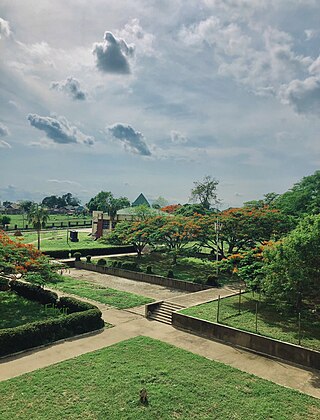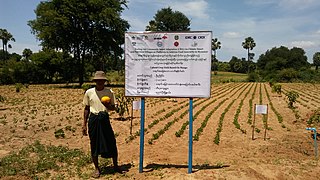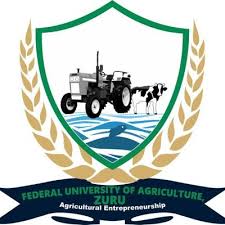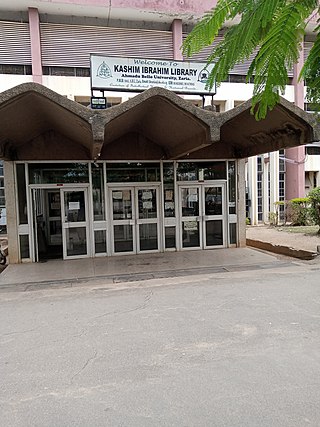Related Research Articles

The United States Department of Agriculture (USDA) is an executive department of the United States federal government that aims to meet the needs of commercial farming and livestock food production, promotes agricultural trade and production, works to assure food safety, protects natural resources, fosters rural communities and works to end hunger in the United States and internationally. It is headed by the secretary of agriculture, who reports directly to the president of the United States and is a member of the president's Cabinet. The current secretary is Tom Vilsack, who has served since February 24, 2021.

The International Institute of Tropical Agriculture (IITA) is a nonprofit organization that works with partners to enhance crop quality and productivity, reduce producer and consumer risks, and generate wealth from agriculture, with the ultimate goals of reducing hunger, malnutrition, and poverty. IITA's research-for-development (R4D) focuses on addressing the development needs of tropical countries. The institute was established in 1967 and headquarters located in Ibadan, Nigeria, with several research stations spread across Africa. The organization is governed by a Board of Trustees, supported by several countries and the Consultative Group on International Agricultural Research (CGIAR).
The International Centre of Insect Physiology and Ecology is an international scientific research institute, headquartered in Nairobi, Kenya that works towards improving lives and livelihoods of people in Africa.

The Federal University of Agriculture, Abeokuta is one of the higher institutions of learning owned and run by the Federal government of Nigeria.

The National Bank for Agriculture and Rural Development (NABARD) is an All India Development Financial Institution (DFI) and an apex Supervisory Body for overall supervision of Regional Rural Banks, State Cooperative Banks and District Central Cooperative Banks in India. It was established under the NABARD Act 1981 passed by the Parliament of India. It is fully owned by Government of India and functions under the Department of Financial Services (DFS) under the Ministry of Finance.

The FederalUniversity of Agriculture, Makurdi (UAM) renamed Joseph Sarwuan Tarka University, Makurdi, Benue State is a higher education institution in Makurdi, Benue State, Nigeria.
Promoting Local innovation in ecologically oriented agriculture and NRM, known as PROLINNOVA, is an NGO-initiated international learning network to promote local innovation in ecologically oriented agriculture and Natural resource management. It is a "Global Partnership Programme" under the umbrella of the Global Forum on Agricultural Research (GFAR). The focus of PROLINNOVA is on recognising the dynamics of indigenous knowledge and enhancing capacities of farmers to adjust to change – to develop their own site-appropriate systems and institutions of resource management so as to gain food security, sustain their livelihoods and safeguard the environment. The essence of sustainability lies in the capacity to adapt.

The Central Institute of Fisheries Education (CIFE) is a Deemed to be a University and institution of higher learning for fisheries science in Mumbai, India. CIFE has over four decades of leadership in human resource development with its alumni aiding in the development of fisheries and aquaculture worldwide, producing notable contributions to research and technological advancements to their credit. It was ranked 9th in India by the National Institutional Ranking Framework in the agriculture and allied sectors ranking for 2024.

The Nigerian Economic Summit Group (NESG) is a non-profit, non-partisan, private sector organisation with a mandate to promote and champion the reform of the Nigerian economy into a modern, globally competitive, sustainable, inclusive, open economy.

The Federal Ministry of Health and Social Welfare is one of the Federal Ministries of Nigeria concerned with the formulation and implementation of policies related to health. It is headed by two Ministers appointed by the President, assisted by a Permanent Secretary, who is a career civil servant. The current Minister of Health is Muhammad Ali Pate. The current Minister of State for Health Iziaq Adekunle Salako.The current Permanent Secretary's of Federal Ministry of Health and Social Welfare is Daju Kachollom.
The Federal Ministry of Labour and Employment is the Nigerian Federal Ministry concerned with relations between workers and employers. It is headed by the Minister of Labour and Employment, who is appointed by the President, and is assisted by a Permanent Secretary, who is a career civil servant.
The Irrigated Rice Research Consortium (IRRC) focuses on agricultural research and extension in irrigated rice-based ecosystems. In partnership with national agricultural research and extension systems (NARES) and the private sector, the IRRC provides a platform for the dissemination and adoption of natural resource management (NRM) technologies in Asian countries. The IRRC is currently active in 11 countries: Bangladesh, Cambodia, China, India, Indonesia, Laos, Myanmar, the Philippines, Sri Lanka, Thailand, and Vietnam. It aims to strengthen NARES-driven interdisciplinary research, link research and extension, facilitate rice farmers' uptake of technological innovations, and enable environmentally sound rice production to expand to feed growing populations.

The Agriculture Department is a department of the Government of Punjab, Pakistan. It is responsible for legislation, policy formulation, and development of agriculture sector in Punjab.

The Cocoa Research Institute of Nigeria (CRIN) in Oyo State, Nigeria, is a cocoa research institute established by the Federal Government of Nigeria through the Nigeria Research Institute Act of 1964. The act established research institutes for cocoa, palm oil, coffee and cola.

Climate-smart agriculture (CSA) is a set of farming methods that has three main objectives with regards to climate change. Firstly, they use adaptation methods to respond to the effects of climate change on agriculture. Secondly, they aim to increase agricultural productivity and to ensure food security for a growing world population. Thirdly, they try to reduce greenhouse gas emissions from agriculture as much as possible. Climate-smart agriculture works as an integrated approach to managing land. This approach helps farmers to adapt their agricultural methods to the effects of climate change.

Yahaya Abubakar Abdullahi is a Nigerian politician and an associate professor. He is the Senator representing Kebbi North Senatorial District of Kebbi State at the 9th National Assembly. He was Senate Majority Leader of the Nigerian 9th National Assembly.

Federal University of Agriculture, Zuru is a Nigerian tertiary institution in Zuru, Kebbi state ran fully by the Federal Government of Nigeria.

Kashim Ibrahim Library is one of Africa's biggest academic libraries located on the main campus of Ahmadu Bello University in Zaria, Nigeria. It is one of the Nigerian First generation libraries commonly referred to as K.I.L. by the Abusites.
The Agricultural Research Council of Nigeria (ARCN) is a Nigerian government agency coordinating and monitoring agricultural research to increase agricultural productivity for economic development. The agency also trains farmers. In 2021, the agency inaugurated Agricultural Radio and Television to disseminate information to farmers more effectively.
References
- ↑ Nnabuife, Collins (2024-10-26). "Tinubu's minister commends stakeholders over devt of proposed extension service delivery bill". Tribune Online. Retrieved 2024-12-01.
- ↑ Nnabuife, Collins (2024-02-14). "Stakeholders intensify effort on extension service bill to boost rural agriculture". Tribune Online. Retrieved 2024-12-01.
- ↑ "History – NAERLS". 2024-11-02. Retrieved 2024-12-01.
- ↑ Nnabuife, Collins (2024-06-26). "NASS to receive agric extension revitalization bill draft, Thursday". Tribune Online. Retrieved 2024-12-01.
- ↑ Rapheal (2024-11-26). "Agricultural Extension Service Bill scales first reading". The Sun Nigeria. Retrieved 2024-12-01.
- ↑ Adaji, Daniel (2024-10-11). "Local maize production costs rise by 69.7% – NARLS". Punch Newspapers. Retrieved 2024-12-01.
- ↑ "Nigeria Key Message Update: Below-average harvest and poor macroeconomy sustain Crisis (IPC Phase 3) or worse outcomes in north (November 2023) - Nigeria | ReliefWeb". reliefweb.int. 2023-12-01. Retrieved 2024-12-01.
- ↑ Gbadamosi, Hakeem (2024-11-05). "Ondo Senator, Adegbonmire, facilitates skill acquisition for 170 youths, women". Tribune Online. Retrieved 2024-12-01.